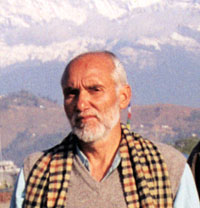 |
 |
Ram Mani Gyawali (pictured) would have been alive today if he wasn't so concerned about the electrification of his home village of Kerunga in Argakhanchi. Ram Mani had been threatened many times, knew he was on the Maoists' hit-list and had been living in Kathmandu for the past three months. But last week he had to go to Butwal to take delivery of a transformer so he could fit it in Kerunga. The family, including his wife, four children and grandchildren were settling down for the night when there was a knock on the door. "Ram Dai," someone called.
He was overpowered by Maoists with pistols and khukuris. There was a quick 'trial'. Others overpowered his wife and son upstairs, and looted their belongings. Ram Mani's body was found later, his head was nearly severed from his body, and there were signs of torture: long half-inch deep khukuri gashes all over his body.
"The body was completely mutilated, he had been hit and slashed," Ram Mani's younger brother Laxman says. "He was killed because he loved his village and wanted to improve it."
Laxman, his wife Sita who was also beaten up, and Ram Mani's family are in Kathmandu's cremation site at Aryaghat this week for the 13-day mourning period. Ram Mani was targeted because he was honest, plain-speaking and a popular VDC chairman. Last year, the Maoists had asked for a Rs 200,000 'donation'. The brothers not only refused to pay, but also held a press conference to say why they were not giving in to extortion.
 |
Ram Mani was killed, but there are hundreds of others who are caught between threats from the Maoists and the counter-insurgency campaign of the security forces.
Urmila Oli of Purandhara VDC in Dang is an inmate at the military camp in Ghorahi. She was the appointed head of the 'people's government' in her village by the Maoists after her husband Bhim Bahadur Oli joined the rebels about two years ago. "I am not a Maoist, they made me one," she told us before breaking down. Seeing his mother sobbing, Urmila's two-year-old son started crying as well.
There are many other 'accidental Maoists' in Ghorahi. Jan Bahadur Pun, 16, took part in the battle of Kapurkot in December and was forced by the Maoists to be a porter, ferrying fallen rebels out in a doko. "With them I had to walk long distances without food or rest," says Pun. "I was in school when they came and took me in." Many of those in detention told us they were enlisted as militia after training to use a musket for seven days.
Pun's camp-mate, 17-year-old Khadga Bahadur Buda of Rolpa, has a different story. He signed up because he had to fulfill a family obligation. "They came and told my father to send a family member to join the militia," says Buda. "They would have killed him otherwise."


